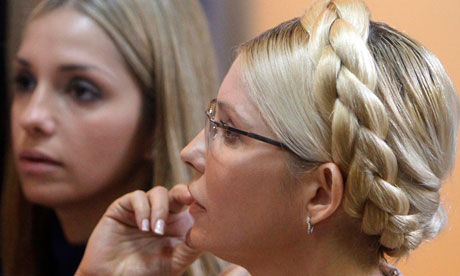
Ukrainian President Yanukovych Determined Not to Let Tymoshenko Go
Publication: Eurasia Daily Monitor Volume: 8 Issue: 191
By:

Contrary to expectations of many observers both at home and abroad, Ukrainian President Viktor Yanukovych has failed to instruct a parliament loyal to him to decriminalize the offences with which former Prime Minister Yulia Tymoshenko had been charged. Rather, he looks determined to keep her behind bars. A court in Kyiv has sentenced Tymoshenko to imprisonment for her role in the controversial 2009 gas deal with Russia. What is more, in spite of a barrage of criticism from the West and Russia, and threats from the European Union to freeze the association and free trade talks which are close to completion, another criminal case has been opened against Tymoshenko. Yanukovych looks set to sacrifice good relations with neighbors in pursuit of his goal to eliminate Tymoshenko from the parliamentary election race next year.
The Pechersky district court in Kyiv on October 11 sentenced Tymoshenko to seven years in prison for exceeding her authority in preparing the January 2009 gas contract with Russia. The court also obliged Tymoshenko to reimburse the equivalent of almost $190 million in damages from the contract to the national oil and gas company Naftohaz Ukrainy. This happened just a day after the EU foreign policy chief, Catherine Ashton, had confirmed at the EU Foreign Affairs Council that Tymoshenko’s imprisonment could prompt national legislatures to block an EU-Ukraine association and free trade accord, which the two sides planned to conclude in December (Ukrainska Pravda, October 11).
The US, the EU and Russia expressed disappointment with the verdict. The European Commission issued a statement warning that it could affect the talks with Ukraine and bilateral cooperation in general. European People’s Party President Wilfried Martens, who has been Tymoshenko’s main supporter in the EU, suggested that the EU should withdraw from the talks (UNIAN, October 11). Yanukovych, commenting on the verdict while on a visit to Slovenia, said it was due to outdated legislation which should be changed shortly so that it should be in line with legal norms accepted in the EU. He added that the verdict was not final and that Tymoshenko should appeal, and he admitted that Tymoshenko’s imprisonment could complicate Ukraine’s integration into the EU (Ukrainska Pravda, October 11).
This was probably interpreted in Brussels as readiness to compromise and decriminalize the article under which Tymoshenko was convicted (see EDM, October 5). Accordingly, on October 12, Ashton told the European Parliament that the EU should continue talks with Ukraine despite the odds (Ukrainska Pravda, October 13). However, on October 13, the security service (SBU) made it clear that Yanukovych’s intentions were misinterpreted and that Tymoshenko could be imprisoned for something that happened in 1996 even if she had been pronounced innocent as far as the 2009 deal concerned.
The SBU said that it had opened a criminal case against the former prime ministers, Tymoshenko and Pavlo Lazarenko, who were suspected of attempting to embezzle $405 million in the 1990s. SBU chief investigator Ivan Derevyanko told a briefing in Kyiv that Lazarenko, who was prime minister at the time, and Tymoshenko masterminded a scheme in 1996 whereby the government was made to pay the debts of the private gas trader United Energy Systems, then chaired by Tymoshenko, to the Russian Defense Ministry (UNIAN, October 13, Kommersant-Ukraine, October 14). This is a very old case. Tymoshenko faced the same charges in the early 2000s, but the case was closed when she became prime minister in 2005. Lazarenko is currently serving a prison term in the US for money laundering on unrelated charges.
The new old case is evidently subject to the statute of limitation, yet both the Ukrainian electorate ahead of the campaign for the October 2012 parliamentary election and Western politicians who defend Tymoshenko are once again reminded of her controversial past. What is more, Ukrainian prosecutors have something else up their sleeves if both the cases related to gas deals do not work. The Prosecutor-General’s Office (PGO) has reminded the public that proceedings in the cases against Tymoshenko regarding the use of funds under the Kyoto Protocol and the purchase of ambulances, both related to the period when she was prime minister in 2007-2010, had been put on hold due to Tymoshenko’s October 11 conviction (UNIAN, October 14). The two cases were opened in December 2010 and January 2011. The PGO suspects that Tymoshenko misused public funds when her government in 2009 imported ambulances under government guarantees and authorized the spending of millions of dollars, which Ukraine received for selling carbon emission quotas to Japan under the Kyoto Protocol on programs unrelated to environmental projects.
Interviewed by Western journalists on October 17, Yanukovych said he would not interfere in the work of the courts to free Tymoshenko. He also denied the reports that he had promised the West to initiate legal changes to decriminalize the offences Tymoshenko was charged with. What is more, he said that the signing of the EU-Ukraine association accord could be postponed if one of the sides were not ready for the event (WSJ, Bloomberg via Ukrainska Pravda, Interfax-Ukraine, October 18).




